5 tips from Mike Uram about reinventing Jewish life
In the spring of 2018, the first ever Harry Kay Leadership Summit presented Rabbi Mike Uram, who literally wrote the book on redefining the Jewish community. Next Generation Judaism: How College Students and Hillel Can Help Reinvent Jewish Organizations offers innovative strategies to keep the Jewish community relevant for the next generation, and Uram discussed his methods with the Twin Cities Jewish community at two events—a workshop for professionals at Jewish organizations and a keynote presentation open to the entire community. Here, our top takeaways:
1. WE DESPERATELY NEED A THESAURUS.
Uram suggests moving away from the phrase “the Jewish community.” This one might be hard for us, but the point is valid: “Every time we use stock phrases like ‘the Jewish community,’ we make a mistake because we fail to acknowledge the complexity of Jewish communities,” Uram writes. “That mistake often leads Jewish organizations to adopt a “one-size-fits-all approach to trying to reach different types of Jews.”
2. NETWORK VERSUS COMMUNITY.
Instead of a community, we should think of ourselves as a network—more transient, and able to shift as the needs of Jews in the Twin Cities change.
3. MORE THAN PLANNING PROGRAMS OR EVENTS, WE NEED TO BUILD RELATIONSHIPS.
Jewish organizations are always dreaming up fun and educational events to remind people about our vibrant Jewish community (see, there we go again with that word). But building relationships with the people who attend the events are more likely to make them feel good about Jewish life in the Twin Cities than immediately beginning to plan the next event.
4. KEEP DOING “HIGH HOLIDAY” EVENTS…BUT DO MORE “PASSOVER SEDER” EVENTS.
Uram divides engagement into two models: the High Holiday model and the Seder model. “The High Holiday model is authentically Jewish,” says Uram. “Huge public spectacles, thousands of people show up, there’s a sense of belonging to something bigger than yourself.” The Passover Seder model, according to Uram, allows smaller groups of people to customize what happens— because they are leading it. “Even though we’re not all together, there’s a sense of belonging to something larger than yourself.”
5. INSTEAD OF “AFFILIATED” AND “UNAFFILIATED,” TRY “ENGAGEMENT” AND “EMPOWERMENT.”
Empowerment Jews are self-directed to seek out Jewish life. “They know all the acronyms,” says Uram. Engagement Jews feel just as Jewish, but they’re looking for ways to connect outside of institutional membership or affiliation.
Our copy of Next Generation Judaism is littered with Post-Its, and we’re already employing some of its strategies. We highly recommend it—you can find it on Amazon, Barnes and Noble, and Indiebound (and we may have a few extra copies at Federation if you ask nicely)





